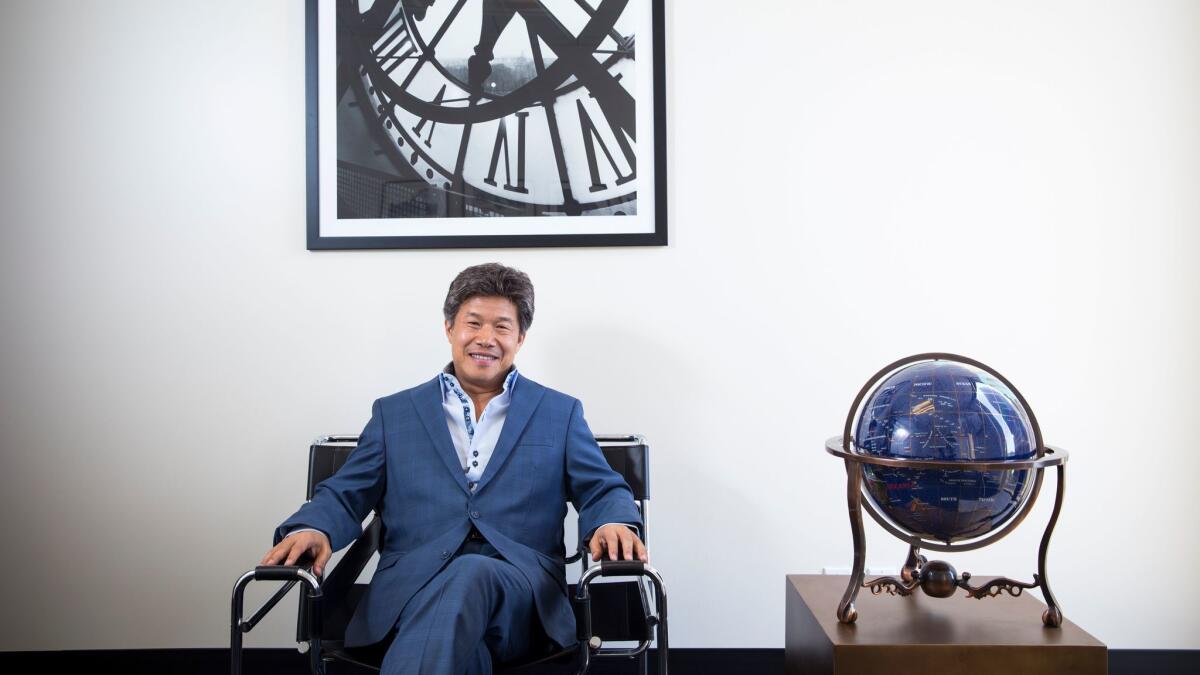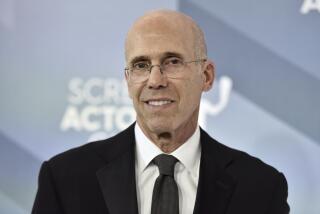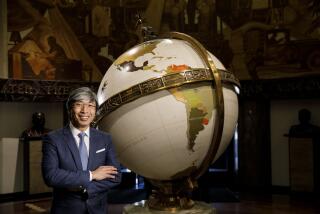Donald Tang, former Bear Stearns money man in China, now wants to remake himself in Hollywood

- Share via
As a prominent Bear Stearns Cos. executive, Donald Tang used his deep connections in China to broker deals and grow the company’s business in Asia. He even arranged for Chief Executive Jimmy Cayne to play bridge with senior Chinese government officials.
But that all ended when Bear Stearns collapsed during the financial crisis of 2008.
A decade later, Tang, 54, is seeking to reinvent himself as a Hollywood player with the same calling card that propelled his rise in finance: bridge-building between industries in the East and the West.
His 2-year-old Los Angeles film and TV firm, Tang Media Partners, with investors including Tencent and Sequoia Capital’s Neil Shen, is trying to achieve an elusive goal long pursued by entertainment executives: create a film company that can both succeed in the U.S. and take advantage of the growing entertainment market in China.
Tang has made intriguing moves by cobbling together entertainment assets. This month, he bought Open Road Films, the U.S. distribution company behind Oscar-winner “Spotlight,” for $28.8 million from theater chains AMC Entertainment and Regal Entertainment. A little more than a year ago, Tang took control of IM Global, which handles foreign distribution and sales to finance independent movies such as “Hacksaw Ridge.”
It’s not yet clear how the companies, when combined, will equal a formidable global studio. The idea, though, is to have Open Road release movies in the U.S. and use IM Global to sell international rights to finance films. He plans to save money by heavily marketing films online to targeted audiences, as is common in China.
Tang Media, which has offices in Shanghai and Beijing, also aims to launch a film distribution business in China, buy Chinese rights to Hollywood movies and invest in Chinese productions.
“We have a truly global next-generation studio in the making,” Tang, dressed in a blue suit and snakeskin shoes, told The Times in his 25-employee office in Century City. “Now we just need to attract like-minded people.... And if we have a team of people, we’re going to make it happen.”
Still, he faces long odds. Multiple wealthy individuals have promised to shake up the industry by backing distributors such as Revolution Studios, Relativity Media and Broad Green only to fall flat. (Tang was a member of the board of Times parent company Tronc Inc. until leaving in March, he said, to focus on his company.)
Tang’s rise also comes at a time when prominent businessmen, including Wang Jianlin of China’s Dalian Wanda Group, have been forced to retreat as the government in Beijing clamps down on overseas entertainment investments. Tang said that, as a U.S. company, his recent deals are not subject to such scrutiny.
Tang, a U.S. citizen who was raised in Shanghai and lives in Beverly Hills, has developed a reputation as an affable go-getter with a growing roster of Hollywood connections, including United Talent Agency CEO Jeremy Zimmer and producer Jerry Bruckheimer. He pursued Open Road for months of on-and-off negotiations with Regal and AMC before they finally reached a deal.
“He’s optimistic and determined,” Zimmer said. “He’s aggressive about what he does, but in a very positive, optimistic way.”
Tang, who was born to college professor parents in Shanghai, moved to California in 1982, with $20 in hand, to follow his girlfriend (now his wife) when he was 18. He studied electrical engineering at Cal Poly Pomona, paying his way through school by working restaurant jobs. After he graduated, he said he applied for 57 engineering jobs and was roundly rejected (he chalks it up to youthful arrogance).
Using his wife’s paycheck, he opened a Merrill Lynch account and started day trading, which eventually led to a job at the company. In 1992, Bear Stearns’ Cayne hired Tang and quickly put him in charge of Bear Stearns Asia in Hong Kong.
The Asian financial crisis of the late 1990s forced Bear Stearns to scale back its China business, and Tang returned to the United States. However, he continued to use his Asia connections to facilitate deals, including the sale of 37% of Hunan Valin Iron & Steel Group to Mittal Steel Co. in 2005. Tang left in 2008, shortly after Bear Stearns was absorbed by JPMorgan Chase & Co.
“All of a sudden I had time to reflect, what the hell am I going to do?” Tang said. “That’s when I did my soul searching, because I felt rejected.”
After his exit from Bear Stearns, he worked as an advisor on several high-profile entertainment deals. He advised Apollo Global Management on the sale of AMC Entertainment to Dalian Wanda Group for $2.6 billion in 2012 and helped set up a 2015 pact for China’s Huayi Brothers Media Corp. to invest in movies released by Burbank studio STX Entertainment. (Tang last year created a separate film fund to invest in STX’s movies.)
“He always had a good Rolodex of people in Chinese business circles,” said Dominic Ng, chairman of Pasadena-based East West Bank. “Donald’s that person who [helps] put it together.”
In 2015, Tang founded Tang Media Partners, sensing a growing demand for entertainment content in the U.S. and China.
Some studio executives privately questioned whether Tang has the financial resources needed to build a bona fide film company out of the pieces he’s accumulated, including Open Road, which lost millions for its previous owners as the market for mid-sized dramas faded.
The plan to combine Open Road and IM Global under one roof has already caused some internal tensions. IM Global founder Stuart Ford was ousted this month after clashing with Tang over the direction of the company and the purchase of Open Road, according to people familiar with the matter but not authorized to comment. Tang hired former Lionsgate film executive Rob Friedman to run newly formed TMP Entertainment, overseeing Open Road and IM Global.
But Tang is bullish about his chances, saying the purchase of Open Road is part of a $500-million expansion plan. Open Road CEO Tom Ortenberg said that the distributor plans to increase its film output and place bigger bets on movies with greater production budgets and wider commercial appeal. Tang has also expanded into TV through a joint venture with Tencent and IM Global.
“The support from the monetary point of view in my view is always secondary,” Tang said. “If you have a good idea and the right plan and the right people to execute it, the money will find you.”
Neither Tang nor Tencent would disclose how much funding Tencent has given to the start-up, though Tang said Tencent is Tang Media’s second-largest shareholder, behind himself. Other backers, he said, include China Media Capital and Chinese asset manager Noah Holdings. Another backer is Shen, who heads the China division of Menlo Park venture capital firm Sequoia Capital.
“We feel he has a good vision of where the industry is going and how to use technology to improve the efficiency of the distribution process for video companies,” said Forest Lin, managing partner of Tencent Investment. “The second part is based on his background in the finance industry and his passion about his business. We believe there is a good chance he can make it happen.”
Tang brushes off skepticism about the Chinese marketplace. He sees an important opportunity to convince U.S. filmmakers to make films that appeal to Chinese consumers. And though the China box office has faced recent head winds, Tang said there’s opportunity in the country’s streaming and video-on-demand market.
“If you actually understand the Chinese sensibility, the sky’s the limit,” he said.
More to Read
Inside the business of entertainment
The Wide Shot brings you news, analysis and insights on everything from streaming wars to production — and what it all means for the future.
You may occasionally receive promotional content from the Los Angeles Times.











